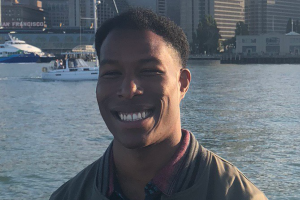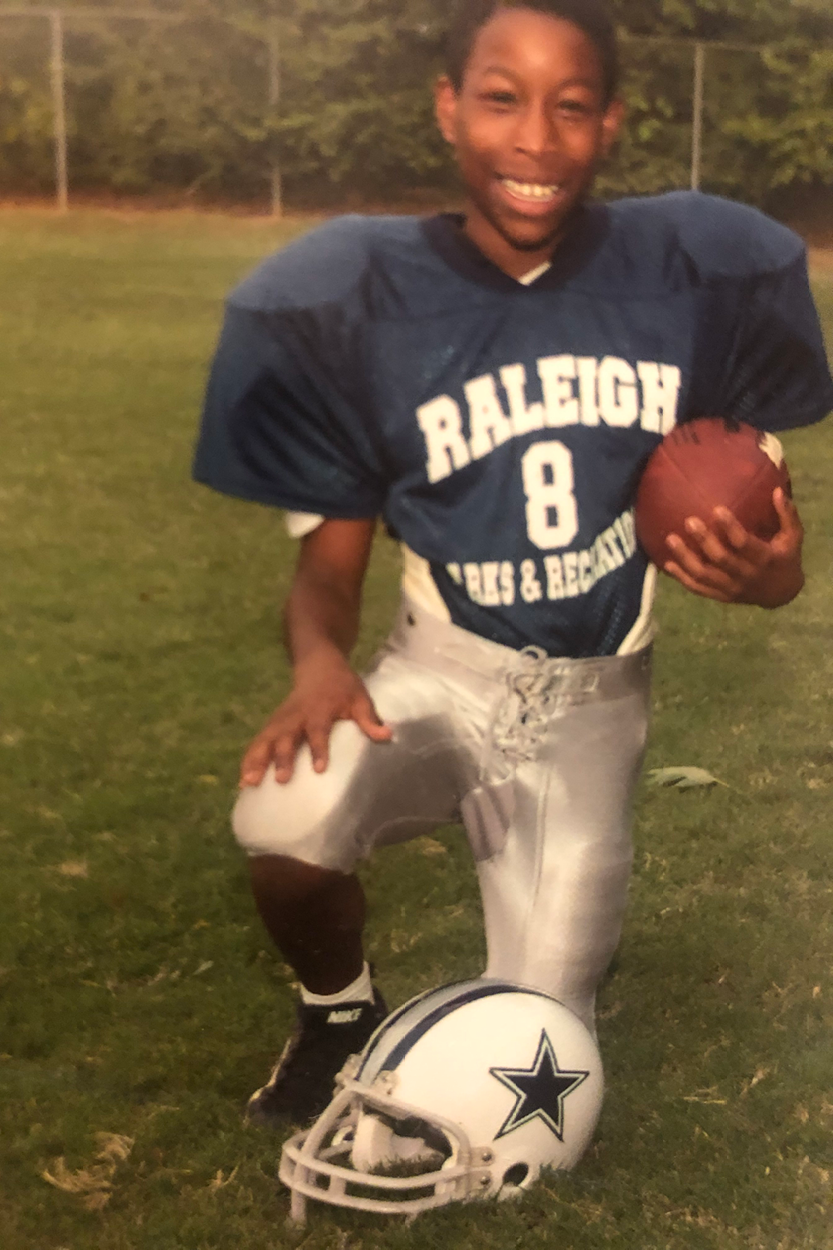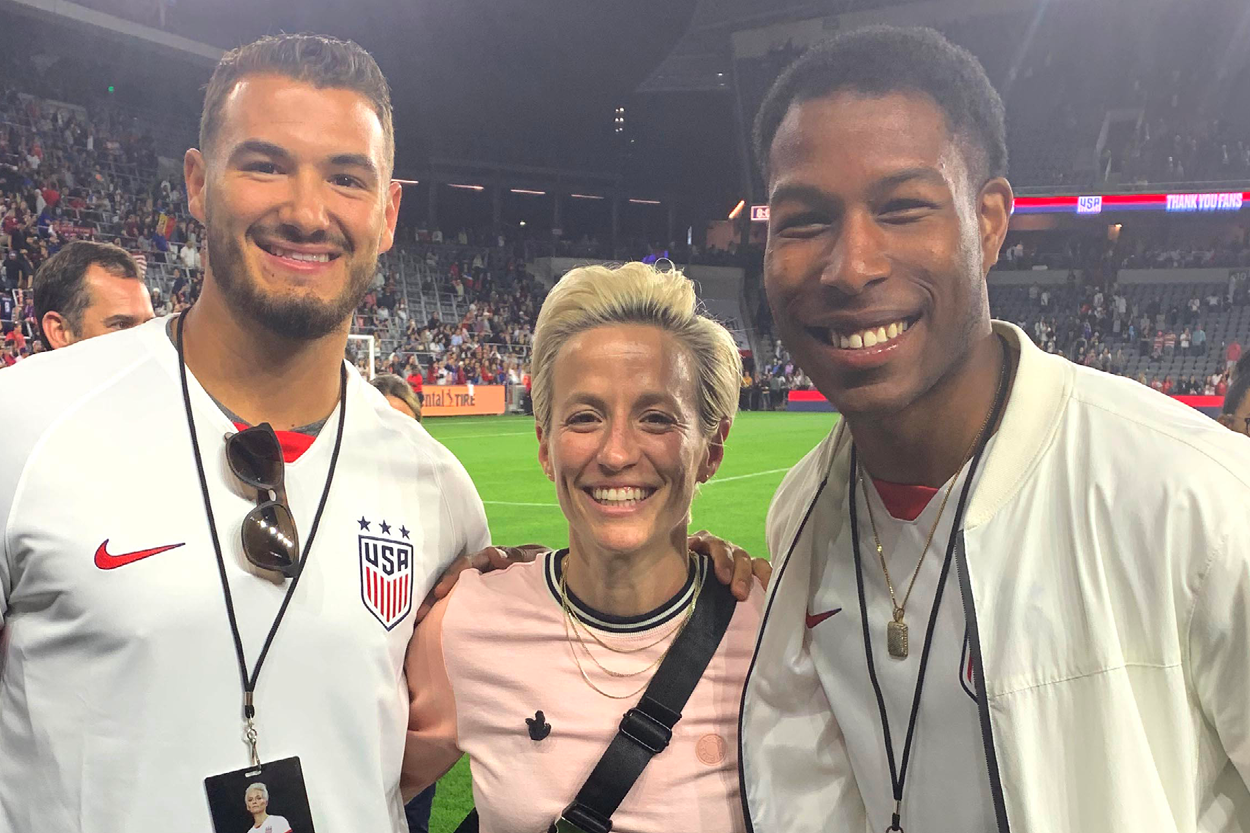Jordan Fieulleteau ’16, ’18 (M.A.) embarks on coveted research fellowship with American Voices Project

by Barbara Wiedemann
After a rigorous selection process involving more than 1,500 candidates, UNC Hussman School of Journalism and Media alumnus and Roy H. Park Fellow Jordan Fieulleteau ’16, ’18 (M.A.) has been named one of 80 research fellows at the American Voices Project undertaken by the Stanford Center on Poverty and Inequality, Princeton University’s Center for Research on Child Wellbeing and the American Institutes for Research.
The project — spearheaded by Kathryn Edin and David Grusky, two of America’s leading poverty and inequality researchers — is currently sending paid fellows to 200 communities across all 50 states plus Native American nations, Washington, D.C., and Puerto Rico.
Over the course of a year, research fellows working in pairs will embed within six different communities for eight weeks at a time each, with four or five days off to travel between sites. All told, the team of researchers and support staff plan to conduct immersive, confidential interviews with a total of 5,000 households.
“We’ll knock on doors. Interview families,” said Fieulleteau. “Hang out with them during the day. Two months at a time gives us time to get to know people.”
The goal is to gain a better understanding of what poverty, inequality and a lack of social mobility in America today really look like; and eventually, to help shape U.S. policy in ways that are relevant to the American experience in 2019 and 2020.
“Hopefully, we can uncover some trends not being talked about in the mainstream press or in legislative policymaking sessions,” Fieulleteau said in his unflappable, soft-spoken voice. “If we’d done this in 2008,” he speculated, “we might have foreseen the opioid crisis. What’s the next opioid crisis that we’re not paying attention to right now?”
That’s what he and his yearlong research partner Trevor Auldridge, a Ph.D. student from the University of California, Santa Barbara, hope to uncover during this first phase of a project that will take the duo to urban communities in California, Arizona and Hawaii.
The two just finished a three-week session in Baltimore, Maryland, that provided intensive training for new fellows in public policy, qualitative interviewing and ethnographic and survey methods.
Fieulleteau arrived in “Charm City” two weeks after celebrating his 24th birthday on Monday, June 10, in Costa Rica with longtime girlfriend Jennifer Jensen, a fellow Carolina graduate and current researcher at the National Institutes of Health who plans to begin a doctoral program in neuroscience at UC-San Diego this fall.
In summer 2020, the American Voices Project fellows will convene again to learn how to analyze the interviews, identify the country’s emerging problems and begin building what the project calls “21st-century policy that responds to the voices of the American people.”
The former Carolina football wide receiver with budding political ambitions called the American Voices Project “the opportunity of a lifetime, to say the least, and I expect it to be life-changing.”
The project allows him to make a commitment to the issues and the urban communities that he cares about most. To understand the level of that commitment, you have to go back 13 years, to a less opportune time in Fieulleteau’s life.
On a wing and a prayer
It was 2006 in New York City. The last five years had been tough and Kendra Clarke was ready to make a change. Gerald Fieulleteau, the father of her twin sons, had died an untimely death five years earlier, when the boys were only six-and-a-half years old.
She wanted a better life for herself and for her sons, wanted to keep them out of trouble and away from the challenges that had nearly overwhelmed them since her husband’s death.
“Believe me when I tell you,” said Clarke, “that I literally Googled ‘nice places to raise children’ and found North Carolina.” And then, she took a risk.
She packed up their belongings and bundled her boys — Justin, the older of the twins, by just one minute over Jordan — into the car. She drove south down Interstate 95 towards the capital city of Raleigh. And she hoped for the best.
Hours of driving later, ”I looked in the back seat and saw the boys sleeping,” said Clarke. “I literally started crying.”
“We came here on a wing and a prayer,” she said of North Carolina.
Two months later, she had a full-time job in the Wake County Public School System. Today, she’s the dean of students at a Title 1 public school in the Charlotte-Mecklenberg area.
Clarke calls herself a risk-taker. Not financially, she stresses, but socially. Jordan Fieulleteau calls her his hero.
He watched his mother struggle as a single parent. He was old enough to remember the lessons his father taught him and to feel the pain of losing his dad to what he describes as a relentless cycle of inner city violence.
“He got up with the wrong people, essentially,” said Fieulleteau, who choked up recalling the devastating memories of that time of loss.
“We were teetering on the poverty line my whole upbringing,” remembered Fieulleteau. “I don’t think that would have been the case if my dad was alive.”
He was getting into trouble. His mother sat him down and insisted that he find a sport to play that would fill his time after school.
 By Fieulleteau’s own account, he and his brother channeled the anger and the sadness of the loss by playing sports; especially football, but also basketball and track. The boys focused on school, too, at their mother’s urging.
By Fieulleteau’s own account, he and his brother channeled the anger and the sadness of the loss by playing sports; especially football, but also basketball and track. The boys focused on school, too, at their mother’s urging.
Trent Wilson, Wakefield High School’s varsity football coach at the time, had a son the boys’ age who had befriended the twins. Wilson observed that throughout middle school and high school in Raleigh, the twin brothers were always very supportive of one another, and that their mother did a great job of raising them single-handedly.
But she needed help.
“It takes a village,” said Wilson. “A lot of coaches and outside influences helped,” he said.
Both boys excelled at football, especially Jordan. He dedicated his athletic achievements to the memory of their father.
Three years from that fateful drive down I-95, the standout 14-year-old wide receiver for the Wakefield Wolverines in Raleigh received his first college offer. He was invited to attend Carolina on a football scholarship.
Fieulleteau remembered, “It was a relief, but also a lot of pressure … making that kind of life decision at that age.”
By January 2013, when he called then-UNC football coach Larry Fedora to formally accept at Carolina following his senior year of high school football, the wide receiver was a 6-foot, 3-inch, 200-pound All-American who’d caught 111 passes for 1,669 yards and 25 touchdowns in his last season for the Wolverines.
Overlooked at the time but perhaps just as significant, he had also been sports editor of The Howler, Wakefield’s student paper, finding time to fuel a passion for journalism.
In February 2013, Coach Fedora tweeted: “Jordan Fieulleteau WR. @TarHeelFootball In school now. Wow had the most TD catches in the nation the last two seasons @GoHeels.”
Mitch Trubisky, a quarterback from Ohio who committed to Carolina early as well, remembers that time.
“I first met Jordan when we both committed to the University of North Carolina,” Trubisky said. “He immediately opened his house to me and invited me down to stay with him any time to visit UNC that year, which was incredible, him living 20 minutes away from campus and me being out of state in Ohio. That told me a lot about Jordan, and we immediately became very close friends.”
The two went on to become roommates along with Ryan Switzer and Khris Francis, and the four quickly became best friends.
‘Try before you die or always wonder what if’—J. Cole
It took a lot of work to make it to the top, to become a bona fide college-level athlete.
It took even more work to stay there, juggling the time demands on a varsity athlete with the rigorous course load at Carolina’s Hussman School, where Fieulleteau had settled into what was then known as the public relations specialization.
Not everything fell immediately into place. His brother Justin, who was on the Carolina football team as well in 2013, left the team a year later. The two have always leaned on each other for support. Fieulleteau said, “He was always there for me when I was down and has had my back forever. I wouldn’t be who I am today without him.”
Jordan Fieulleteau was redshirted in 2013; didn’t see much playing time in 2014; and appeared in six games as a wide receiver in 2015, backup behind receivers Ryan Switzer, Mack Hollins and Bug Howard. He felt he was just as talented, but was getting far less playing time.
But the Hussman School student was fired up about what he was learning about strategic communications at the Hussman School. He had a plan.
“During the fall 2015 semester, Jordan invited me to football practice,” remembered Hussman School Associate Professor Trevy McDonald. “Over dinner, he got a big smile on his face and shared with me that he would graduate early — as I did — and really wanted to attend graduate school at UNC.”
Fieulleteau said, “Trevy convinced me I could do it.”
“One afternoon in our ‘Black Press and U.S. History’ course during the spring 2016 semester, I saw that same smile again,” said McDonald. “After class, Jordan shared with me that he received his acceptance letter [to the Hussman School master’s program] during our class.”
Fieulleteau left the team, certain he would be a lot happier not playing football at UNC. His focus on his media and communications studies became even more driven.
His friend Mitch Trubisky remembers that time as well.
 “Jordan found his passion in journalism while also playing football,” he said. "And for me, that was exciting to see because for us as football players, our main passion and the only one we had known for most of our lives was football.”
“Jordan found his passion in journalism while also playing football,” he said. "And for me, that was exciting to see because for us as football players, our main passion and the only one we had known for most of our lives was football.”
“He went through adversity as well," Trubisky added. “And I watched him overcome the situation he was in and still develop a positive attitude about it and keep pushing forward. That made him into the man he is today.”
The PR student from Raleigh graduated with his bachelor’s degree in 2016 and enrolled in the graduate program at the Hussman School that fall. He became a Roy H. Park Fellow the following spring. He then enrolled in the graduate program at NC Central University that summer and played the 2017 football season with the Eagles as a graduate transfer, taking graduate classes at both universities.
Trubisky was drafted by the National Football League’s Chicago Bears with the second overall pick in the NFL Draft in 2017. Their roommate, Ryan Switzer, went to the Dallas Cowboys in that year’s draft and has since been traded to the Oakland Raiders and then the Pittsburgh Steelers.
“Football is a ruthless business,” said Wakefield’s Wilson. “I always tell my players that. Some guys will make it past you. Others will lose their fire. Reasons are sometimes hard to understand. But that’s why I encourage them to always balance [football] with academics.”
“I think I realized before most of my teammates did that football wouldn’t last forever,” said Fieulleteau. “I decided to take school even more seriously. To better myself, for once football was over.”
He added, “So many doors opened for me then.”
The work ethic he’d honed as a student-athlete, the experience he’d gained working as a team with people from all different backgrounds, the ability to take constructive criticism: all of the skill sets he’d developed as an athlete helped pave the way to a graduate degree and experiences he had never even dreamed of.
He traveled to Belgium as one of 16 media and journalism graduate students selected nationwide as delegates to the European Union in 2017; dined with members of the North Carolina Supreme Court in an event co-sponsored by the UNC Center for Media Law and Policy and the North Carolina Press Association in 2018; debated Tucker Carlson as a panelist during the FOX News host's lecture on campus in 2018; and participated in internships that were impossible to take advantage of as a varsity athlete.
Looking back, Fieulleteau said, “The J-school is monumental in who I am today, [shaping me by] trusting me and challenging me to be my best.”
Playing the long game
Fieulleteau considered various options after graduating from Carolina with his master’s degree in mass communications in May 2018, some in corporate public relations and others in progressive politics, a world he is increasingly drawn to. He ended up at Facebook headquarters in Palo Alto for a year.
“To be working at a company with that kind of impact and reach — 3 billion people across Facebook and Instagram and WhatsApp platforms — it just doesn’t get any better than that,” he said of the insights gained at one of the world’s most powerful technology companies.
Mulling over next steps, Fieulleteau kept returning to a growing sense that he could personally make the world a better place as a public servant. He had decided to study for the LSATs and focus on civil rights law in preparation for that type of long game, when he learned about the American Voices Project.
As soon as he saw the project description, he knew he wanted to be a fellow. He was certain he could effectively reach people living in poverty in urban areas and situations like the ones he’d grown up living with as a young child.
“Urban inner city,” he noted. “That’s where I come from.”
Today, as he finds a temporary home in California and prepares to meet his first American Voices community, he expects that his travels and the people he will meet in communities across the country will give him a uniquely in-depth view of life in America. “Better than most politicians have,” he said. He hopes the yearlong experience will provide personal insights as to how he can best be a trailblazer for his generation.
“We strive to help our students build upon their life experiences by giving them the tools to be resilient and to adapt as opportunities present themselves,” said Dean Susan King. “I‘m proud of Jordan for seizing the moment, pivoting to take advantage of what will likely be a life-altering and deeply meaningful journey, and for realizing that a degree in strategic communications sets him up for access in many different arenas.”
As he envisions a future role as a public servant or politician in North Carolina, a role he hopes would allow him to be a voice for the issues that many people his age and his race care about, he sees the American Voices Project as another steppingstone along a life’s path that he has grown into, one passion at a time.
“I don’t do anything by accident,” he notes.
“I can’t wait to see what Jordan does next,” said Trubisky, echoing a sentiment expressed by many of those who know Fieulleteau best. “I look forward to seeing the positive impact and the difference he will make at whatever project he gets into next.”
Childhood photo courtesy Kendra Clarke.